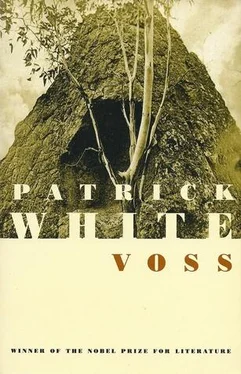THREE little girls, three friends, were tossing their braided heads in the privacy of some laurels, a nest of confidences and place of pacts, to which they almost always repaired with the varnished buns that the younger Miss Linsley distributed to the children at eleven o’clock.
‘I like potatoes,’ Mary Hebden said.
‘Mmmm?’ Mary Cox replied, in doubt.
‘I like pumpkin best,’ said Mary Hayley.
‘Oh, well, best !’ Mary Hebden protested. ‘Who was talking of best? ’
They were all three skipping and jumping, as they licked the few grains of sugar off the insipid, glossy buns. It was their custom to do several things at once, for freedom is regrettably brief.
‘I like strawberries best .’ Mary Hebden jumped and panted.
‘Strawberries!’ shrieked Mary Cox. ‘Who will get strawberries?’
‘I will,’ said Mary Hebden. ‘Although I am not supposed to tell.’
‘That is one of the things you expect us to believe,’ Mary Hayley said. ‘As if we was silly.’
‘Simple dimple had a pimple,’ chanted Mary Cox.
‘Syllables of sillicles,’ sang Mary Hayley, in her rather pure voice.
‘Very well, then,’ said Mary Hebden. ‘I had begun to tell. But will not now. Thanks to you, they will not be able to say I cannot keep promises.’
Mary Hebden had stopped. She shook her braids with mysterious importance, and began to suck her inkstains.
‘Old ink-drinker!’ accused Mary Cox.
‘I will drink sherbet this afternoon,’ said Mary Hebden.
She held her finger up to the light, and the sucked ink shone.
‘Like anything, you will,’ said Mary Hayley. ‘Between sewing and prayers.’
‘Very well, then,’ cried Mary Hebden, who could not bear it. ‘I will tell you.’
All the braids were still.
‘I am going to a party at Waverley, for grown-up people, at the home of Mrs de Courcy, who is a kind of cousin of my father’s.’
‘A party in term time?’ doubted Mary Cox.
‘And if it is for grown-ups, why should a child be going?’ asked Mary Hayley. ‘I do not believe it.’
‘It is a special occasion. It is quite true, I tell you.’
‘You have told us so many things,’ said Mary Cox.
‘But this is true. I swear it upon my double honour. It is a party for my uncle, who has come back from searching for that explorer who got lost. That German.’
‘Uggh!’ said Mary Hayley. ‘Germans!’
‘Do you know any?’ asked Mary Cox.
‘No,’ Mary Hayley replied. ‘And I do not want to. Because I would not like them.’
‘You are the silly one,’ Mary Hebden decided.
‘My father says that if you cannot be English, it is all right to be Scotch. But the Irish and everyone else is awful,’ said Mary Hayley. ‘Although the Dutch are very clean.’
‘But we are not English, not properly, not any more.’
‘Oh, that is different,’ said Mary Hayley. ‘Yourself is always different.’
‘Any way,’ said Mary Hebden, ‘if that German had not got lost, and my uncle had not gone to look, there would not be a party.’
‘But if your uncle did not find the German,’ said the doubting Mary Cox.
‘It was still a brave thing to do,’ Mary Hebden replied.
‘My father says,’ said Mary Hayley, ‘the German was eaten by blacks, and a good thing, too, if he was going to find land for a lot of other Germans.’
‘Listen, Mary,’ said Mary Cox, ‘could you make us a parcel with some little cakes and things? If you are really going.’
‘That would be stealing,’ Mary Hebden replied.
‘But you can steal from your cousin,’ said Mary Hayley. ‘Just a few cakes. And us living on boiled mutton.’
‘I will see, then.’
‘How will you go?’ asked Mary Cox.
‘In a hired carriage, with Miss Trevelyan.’
‘Oooohhh!’ moaned those who were less fortunate.
‘You awful thing!’ cried Mary Cox.
‘I will tell you something,’ said Mary Hayley.
‘What?’
‘Miss Trevelyan let me brush her hair.’
‘I do not believe it. When?’
‘The night I was so bilious, because I was nervous, because Mamma had left for Home.’
‘It was the treacle toffee that Maud Sinclair made.’
‘Any way ,’ continued Mary Hayley, ‘Miss Trevelyan took me into her room, and let me brush her hair. It was so lovely. It was all cut off once, but grew again, thicker than before.’
‘I heard my aunts talking, and there is something funny about Miss Trevelyan.’
‘Oh, that! It is all nonsense. I thought: if only I could snip a little bit of hair. Her back was turned, of course. But I did not have the courage.’
‘Look, there she is!’ Mary Hebden pointed.
‘Where?’
They were turning and burning in the secret laurels. Then they shook out their week-day pinafores, and raced.
‘I will beat you,’ Mary Hayley squealed.
‘Gels!’ called the elder Miss Linsley, who was chafing her cold hands upon the hot veranda. ‘It is never too early to practise self-control.’
Older girls, or more practised young ladies, were walking and talking, and frowning at the dust that the three Marys had kicked up. Anything more graceful than the older girls could only have broken; the laws of nature would have seen to it. Their porcelain necks were perfect, and their long, cool hands always smelled of soap. Deftly they carried large, clean books in the crooks of their arms, against their brittle waists, albums of pieces for piano and harp, histories of England, botanies, sheaves of porous drawing-paper. On Friday evenings they studied deportment.
‘Who will control Mary Hayley?’ Lizzie Ebsworth frowned.
‘I was under the impression,’ Nelly Hookham began, lowering her voice on account of the seriousness of what she was about to communicate, ‘I was always under the impression that the Hayleys were Roman Catholics.’
And she looked over her shoulder.
‘Oh, dear, no,’ said Maud Sinclair, who was plain and kind. ‘My aunts know them. The Hayleys are all right.’
‘This one, of course, is encouraged by Miss Trevelyan,’ said Nelly Hookham.
‘Yes,’ said Lizzie. ‘There she is.’
The three girls stood watching, their necks turned beautifully.
‘Poor thing,’ said Maud Sinclair.
‘Why?’
‘Well, you know ,’ said Nelly Hookham.
‘But do we know?’ asked Lizzie Ebsworth.
‘She has had a hard time,’ Maud Sinclair said.
‘She is horrid,’ said Lizzie. ‘She is sarcastic in mathematics.’
‘She is certainly rather peculiar,’ sighed Nelly.
‘She is a dear, really,’ said Maud.
‘I would not dare speak to her about anything of interest,’ said Nelly. ‘I would be terrified, in fact, to speak to her about anything that was not strictly necessary.’
‘Certainly she is sometimes severe,’ Maud allowed. ‘But, poor thing, I expect it is because she is disappointed.’
Lizzie Ebsworth was embarrassed. She laughed.
‘How old do you suppose she is?’
‘Twenty-six.’
‘At least.’
Silence fell.
‘Do you know,’ said Lizzie, ‘I have received a letter from Mary Hebden’s eldest brother, whom I met at the Pringles’ last winter.’
‘Oh, Lizzie, you did not tell us!’
‘What colour is he?’
Lizzie was carefully breaking a twig.
‘I do not think one would say he is any particular colour,’ she replied, after some consideration.
‘I like reddish men,’ Nelly Hookham confessed too quickly, and blushed.
‘Oh, no .’
‘Well, I mean, not so much red,’ she protested, ‘as a kind of warm chestnut.’
Читать дальше












